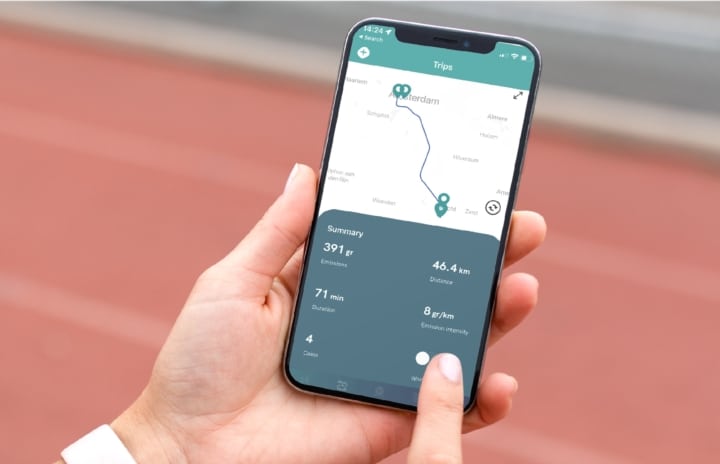Meeting the Reporting Requirement with a survey, how does it work?
The Reporting Requirement Work-related Mobility of Persons requires employers with 100 or more employees to keep track of all commuting and business trips, the number of kilometers traveled, and the mode of transportation. Would you like to know more about the legislation? Click here.
Does a survey offer a complete solution?
With a survey, you ensure compliance with the government’s minimum commute kilometers reporting requirement. This applies at least until 2024. If the climate agreement targets are not met, there will be an interim cap introduced, and the survey option is expected to disappear.
Only commuting trips via survey.
When the commuting distance and work days are consistent, the information can be retrieved using a survey. In some cases, this applies to a large portion of the workforce, think of retail organizations where most of the staff always travel to the same store or hospitals, healthcare facilities, factories, and distribution centers. For employees who visit many different locations and travel a lot of business kilometers, the survey does not apply.
Sample
How many employees must complete the survey? A large number of respondents is necessary to obtain a result that can be generalized to the entire group. The government has strict standards for this: the confidence level must be 95% with a 2% margin of error. For smaller companies, this means that almost all employees are required to complete the survey. Some examples are:
- 100 employees require 97 respondents
- 1000 employees require 707 respondents
- 2000 employees require 1092 respondents
Fynch ensures that conclusive reporting records are created by using the Fynch app in combination with the additionally allowed methods.
Important! Business kilometers cannot be extracted with the survey.
What data is not retrieved from the survey?
It is important to realize that, in many cases, the survey is insufficient to meet the Reporting Requirement Work-related Mobility of Persons. The survey is only suitable for collecting (fixed) commuting trips. Examples that require alternative solutions are:
- Business mobility – lease transportation
- Business mobility – mobility services
- Business mobility – own transport (possibly declared kilometers)
How does this work?
Keeping track of all these travel movements involves a lot of administration. The Fynch app and platform are designed to make this administrative process easy. Yet one of the most frequently asked questions from our clients is, “How do I get out of it?”
Some clients have read the 45-page long handout distributed by RvO and have come across the possibility of conducting an internal survey. This seems like a simple solution, but is it really that simple?
In some cases it is. This blog, by use of examples, will explain to you when the survey is and is not sufficient.
1. No business trips
There are no business trips made or all business trips are declared and employees receive a fixed reimbursement for commuting trips.
In this case, if relevant, there are complete records of business trips. Therefore, only commute trips need to be obtained. If this is the case, the survey is sufficient to meet the reporting requirement.
NOTE. The fixed allowance has been adjusted since January 2022, only actual traveled kilometers can be reimbursed. Leave days, vacations, and sick days must be deducted; the burden of proof is the responsibility of the employer.
2. Lease Cars
There is a lease car fleet. Many lease drivers do not keep trip records and potentially also privately drive the lease for which additional taxes are paid.
To guarantee complete administration, we recommend using the Fynch app to record and categorize all trips into commuting, business, or personal. If this is not possible, the survey can also be used to collect the necessary information. In addition to the survey, the following information must also be collected:
- Annual kilometers and fuel type per vehicle
- Information on whether the vehicle was also driven privately
3. Mobility Services
The employer provides mobility services for business and/or commuting travel.
This situation is similar to situation 2. In this situation, there are three options:
- The employee can use mobility services for all commuting and business travel
A split between commuting and business trips must be made. The survey results can provide the total kilometers traveled (retrieved from the supplier) and can divide this between commuting and business. - The employee may privately use the mobility services
The same applies. A distinction between the private and business kilometers must be made using the government method. - The employee uses the mobility services only for business travel, and other services are used for commutes
In this case, the survey will be used to gain insight into the commuting kilometers.
4. A combination
The company uses a combination of the above-mentioned examples, with possible supplementation of other variables such as declarations.
Fynch Mobility offers a solution where all commuting and business trips as well as work-from-home days are (automatically) recorded and reported.
This insight will lead to behavioral change on a personal level, and an employer can use the collected data to further optimize their mobility policy.
The above-mentioned examples show that there are situations where (part of) the workforce can meet the reporting requirement with the survey.
However, with Fynch Mobility we want to offer you a solution for all employees, Fynch ensures that your organization complies with the Reporting Requirement Work-related Mobility of Persons. To achieve this we use our app and platform but the survey is also among the possibilities.
We are happy to help you.

